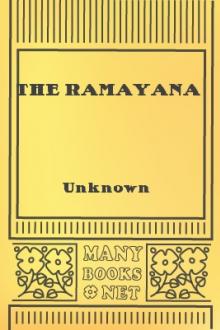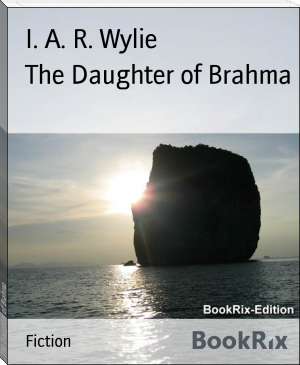The Ramayana - Valmiki (best ereader for epub txt) 📗

- Author: Valmiki
- Performer: -
Book online «The Ramayana - Valmiki (best ereader for epub txt) 📗». Author Valmiki
spake by rage impelled,
Red grew his eyes, his fierce lips swelled.
His bark coat round his form he drew
And coiled his hermit braids anew,
Like Rudra when he yearned to slay
The demon Tripur509 in the fray.
So looked the hero brave and wise,
The fury flashing from his eyes.
Then Ráma, conqueror of the foe,
From Lakshmaṇ's hand received his bow,
Strained the great string, and laid thereon
A deadly dart that flashed and shone,
And spake these words as fierce in ire
As He who ends the worlds with fire:
“As age and time and death and fate
All life with checkless power await,
So Lakshmaṇ in my wrath to-day
My vengeful might shall brook no stay,
Unless this day I see my dame
In whose sweet form is naught to blame,—
Yea, as before, my love behold
Fair with bright teeth and perfect mould,
This world shall feel a deadly blow
Destroyed with ruthless overthrow,
And serpent lords and Gods of air,
Gandharvas, men, the doom shall share.”
Canto LXVI. Lakshman's Speech.
He stood incensed with eyes of flame,
Still mourning for his ravished dame,
Determined, like the fire of Fate,
To leave the wide world desolate.
His ready bow the hero eyed,
And as again, again he sighed,
The triple world would fain consume
Like Hara510 in the day of doom.
Then Lakshmaṇ moved with sorrow viewed
His brother in unwonted mood,
And reverent palm to palm applied,
Thus spoke with lips which terror dried
“Thy heart was ever soft and kind,
To every creature's good inclined.
Cast not thy tender mood away,
Nor yield to anger's mastering sway.
The moon for gentle grace is known,
The sun has splendour all his own,
The restless wind is free and fast,
And earth in patience unsurpassed.
So glory with her noble fruit
Is thine eternal attribute.
O, let not, for the sin of one,
The triple world be all undone.
I know not whose this car that lies
In fragments here before our eyes,
Nor who the chiefs who met and fought,
Nor what the prize the foemen sought;
Who marked the ground with hoof and wheel,
[pg 307]
Or whose the hand that plied the steel
Which left this spot, the battle o'er,
Thus sadly dyed with drops of gore.
Searching with utmost care I view
The signs of one and not of two.
Where'er I turn mine eyes I trace
No mighty host about the place.
Then mete not out for one offence
This all-involving recompense.
For kings should use the sword they bear,
But mild in time should learn to spare,
Thou, ever moved by misery's call,
Wast the great hope and stay of all.
Throughout this world who would not blame
This outrage on thy ravished dame?
Gandharvas, Dánavs, Gods, the trees,
The rocks, the rivers, and the seas,
Can ne'er in aught thy soul offend,
As one whom holiest rites befriend.
But him who dared to steal the dame
Pursue, O King, with ceaseless aim,
With me, the hermits' holy band,
And thy great bow to arm thy hand
By every mighty flood we'll seek,
Each wood, each hill from base to peak.
To the fair homes of Gods we'll fly,
And bright Gandharvas in the sky,
Until we reach, where'er he be,
The wretch who stole thy spouse from thee.
Then if the Gods will not restore
Thy Sítá when the search is o'er,
Then, royal lord of Kośal's land,
No longer hold thy vengeful hand.
If meekness, prayer, and right be weak
To bring thee back the dame we seek,
Up, brother, with a deadly shower
Of gold-bright shafts thy foes o'erpower,
Fierce as the flashing levin sent
From King Mahendra's firmament.
Canto LXVII. Ráma Appeased.
As Ráma, pierced by sorrow's sting,
Lamented like a helpless thing,
And by his mighty woe distraught
Was lost in maze of troubled thought,
Sumitrá's son with loving care
Consoled him in his wild despair,
And while his feet he gently pressed
With words like these the chief addressed:
“For sternest vow and noblest deed
Was Daśaratha blessed with seed.
Thee for his son the king obtained,
Like Amrit by the Gods regained.
Thy gentle graces won his heart,
And all too weak to live apart
The monarch died, as Bharat told,
And lives on high mid Gods enrolled.
If thou, O Ráma, wilt not bear
This grief which fills thee with despair,
How shall a weaker man e'er hope,
Infirm and mean, with woe to cope?
Take heart, I pray thee, noblest chief:
What man who breathes is free from grief?
Misfortunes come and burn like flame,
Then fly as quickly as they came.
Yayáti son of Nahush reigned
With Indra on the throne he gained.
But falling for a light offence
He mourned a while the consequence.
Vaśishṭha, reverend saint and sage,
Priest of our sire from youth to age,
Begot a hundred sons, but they
Were smitten in a single day.511
And she, the queen whom all revere,
The mother whom we hold so dear,
The earth herself not seldom feels
Fierce fever when she shakes and reels.
And those twin lights, the world's great eyes,
On which the universe relies,—
Does not eclipse at times assail
Their brilliance till their fires grow pale?
The mighty Powers, the Immortal Blest
Bend to a law which none contest.
No God, no bodied life is free
From conquering Fate's supreme decree.
E'en Śakra's self must reap the meed
Of virtue and of sinful deed.
And O great lord of men, wilt thou
Helpless beneath thy misery bow?
No, if thy dame be lost or dead,
O hero, still be comforted,
Nor yield for ever to thy woe
O'ermastered like the mean and low.
Thy peers, with keen far-reaching eyes,
Spend not their hours in ceaseless sighs;
In dire distress, in whelming ill
Their manly looks are hopeful still.
To this, great chief, thy reason bend,
And earnestly the truth perpend.
By reason's aid the wisest learn
The good and evil to discern.
With sin and goodness scarcely known
Faint light by chequered lives is shown;
Without some clear undoubted deed
We mark not how the fruits succeed.
In time of old, O thou most brave,
To me thy lips such counsel gave.
Vṛihaspati512 can scarcely find
New wisdom to instruct thy mind.
For thine is wit and genius high
Meet for the children of the sky.
I rouse that heart benumbed by pain
And call to vigorous life again.
Be manly godlike vigour shown;
Put forth that noblest strength, thine own.
[pg 308]
Strive, best of old Ikshváku's strain,
Strive till the conquered foe be slain.
Where is the profit or the joy
If thy fierce rage the worlds destroy?
Search till thou find the guilty foe,
Then let thy hand no mercy show.”
Canto LXVIII. Jatáyus.
Thus faithful Lakshmaṇ strove to cheer
The prince with counsel wise and clear.
Who, prompt to seize the pith of all,
Let not that wisdom idly fall.
With vigorous effort he restrained
The passion in his breast that reigned,
And leaning on his bow for rest
His brother Lakshmaṇ thus addressed:
“How shall we labour now, reflect;
Whither again our search direct?
Brother, what plan canst thou devise
To bring her to these longing eyes?”
To him by toil and sorrow tried
The prudent Lakshmaṇ thus replied:
“Come, though our labour yet be vain,
Free e-book «The Ramayana - Valmiki (best ereader for epub txt) 📗» - read online now
Similar e-books:





Comments (0)